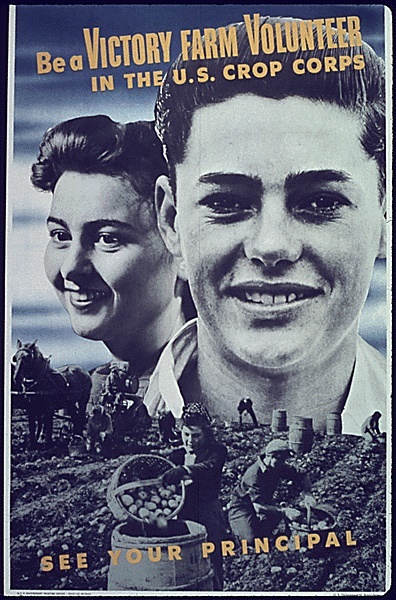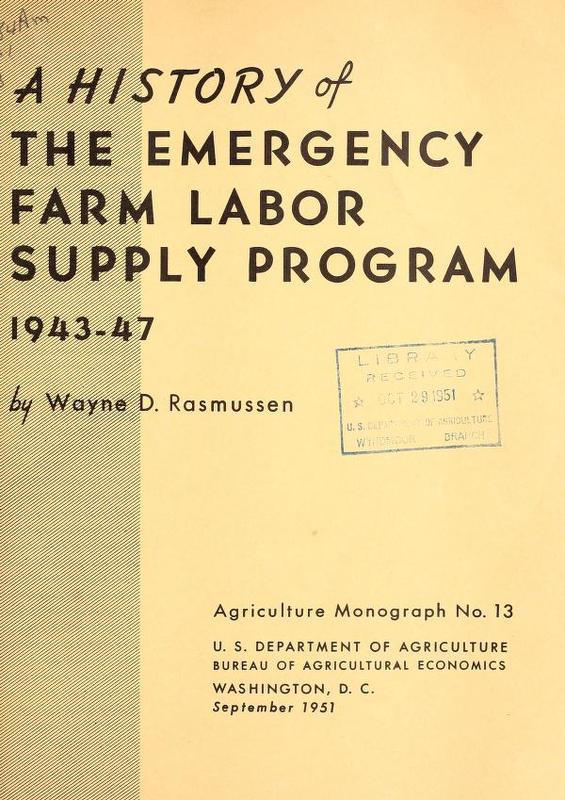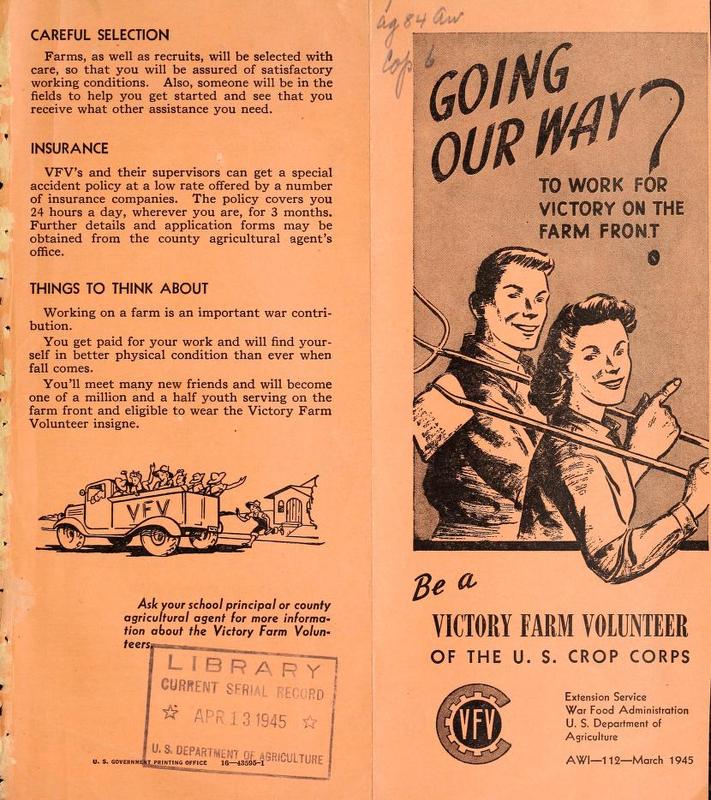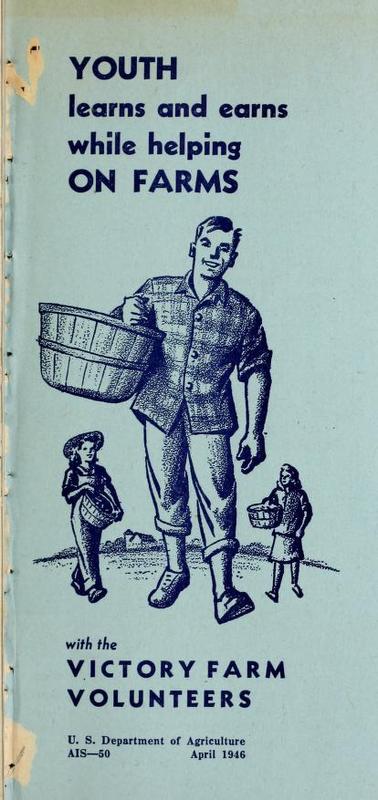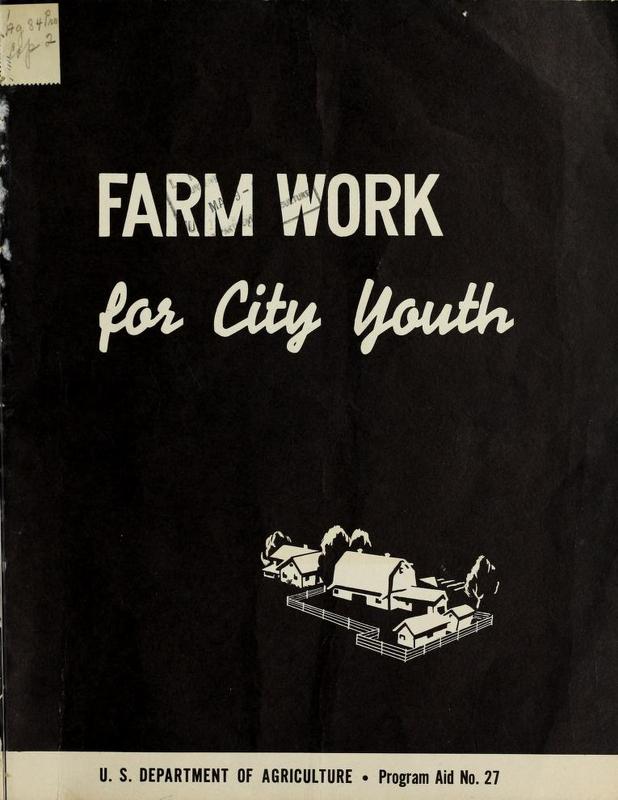Victory Farm Volunteers
Be a Victory Farm Volunteer, (1942-45). Office for Emergency Management. Office of War Information. Domestic Operations Branch. Bureau of Special Services. National Archives and Records Administration. 44-PA-444
The purpose of the wartime emergency farm-labor supply program was to assist farmers in producing vital food by making labor available at the time and place it -was most needed. Certain aspects of the program, particularly the provision of housing and medical care, were adapted from a farm labor program that had developed during the depression. As this development influenced considerably the evolution of the 1943-47 program, the first two chapters of this monograph are concerned with Departmental activities undertaken before Congress made the first direct appropriation for the 1943-47 program, and with the change from depression-born social welfare programs based on an oversupply of labor to the war program based on a demand for labor far exceeding the supply.
A History of the Emergency Farm Labor Supply Program, 1943-47. Rasmussen, W.D. (1951). Bureau of Agricultural Economics. U.S. Department of Agriculture. Agriculture Monograph Number 13.
"The primary aim of the [Victory Farm Volunteers] program was to assist farmers and increase food production by making nonfarm youth available for farm work. This primary aim was achieved in many areas. In addition, when the program was carried out with sufficient attention to recruitment, placement, and supervision, city youth had valuable work experience and learned something of rural living, and at the same time real understanding between city and country people increased."
Victory Farm Volunteers of the U.S. Crop Corps Need 500,000 Boys and Girls (1943). AWI: Number 52.
U.S. Department of Agriculture. Extension Service.
"WHY THE FARMER NEEDS YOUR HELP
The farmer has one of the Nation's most important jobs. Uncle Sam has called on him to raise food for our fighting men, our war workers, and our allies. His sons and hired men may be in the armed forces or working in war plants. More food than ever must be produced with fewer people to do it. Everybody who can must help!
HOW BOYS AND GIRLS CAN GET WORK ON A FARM THIS SUMMER
Be a Victory Farm Volunteer. This is the title given boys and girls volunteering for work on farms this summer. The volunteers are part of the U.S. Crop Corps. The best estimate is that half a million boys and girls will be needed.
In many high schools the Victory Farm Volunteers may be a part of the High School Victory Corps. Private and parochial schools may also organize a VFV group. A teacher in the school will be in charge of Victory Farm Volunteer recruitment. County agricultural agents with the help of local volunteer committees will arrange for the placement and supervision of the boys and girls on farms."
Join us on the farm front: Be A Victory Farm Volunteer of the U.S. Crop Corps (1944). AWI: Number 91.
U.S. Department of Agriculture. War Food Administration. Extension Service.
"CALL TO AMERICAN YOUTH!
THE FARMER NEEDS YOUR HELP
Some 900,000 of you responded to the Nation's call for help on the farm front last year. You helped farmers to produce the largest crop in our country's history — food for our fighting men, our allies, and ourselves. This year even more food is needed; food for a bigger army, more for lend-lease and for liberated peoples. Food is a weapon of war and a weapon of peace!"
Going Our Way?: To Work For Victory On The Farm Front (1945). AWI: Number 112.
U.S. Department of Agriculture. War Food Administration. Extension Service.
"UNTIL VICTORY IS WON YOUR WAR JOB IS ON THE FARM
Are you one of the million or more patriotic boys and girls who worked on a farm last summer? If so, the farmers need your help again. In fact, as long as the war creates this serious manpower shortage on the farm, your help is needed. If you have never been on a farm before, don't let that stop you. Here's your chance to do a real war job.
You don't have to be told that food is a weapon of war. That's an old story by now. Everyone knows how the 6 million farms of this country have turned on full steam to produce the food necessary not only to supply our armies and our civilian population, but to share with our allies and the liberated nations. Truly, it has been a remarkable accomplishment."
Youth Lends a Hand: Victory Farm Volunteers (1945). AWI: Number 116.
U.S. Department of Agriculture.
"Who Are the VFV's?
Victory Farm Volunteers are the Nation's town and city youth who are helping farmers with their production job in every State in the Union- soldiers of the soil in war and peace. Marching 875,000 strong in 1944, and using dungarees, overalls, or just plain old clothes as their uniforms, they went to war against the farm labor shortage. Thousands of tons of food for the allied war effort was their contribution.
VFV's are those members of the United States Crop Corps who are under 18 years of age. Under the United States Department of Agriculture's Farm Labor Program, they are organized by the extension services of the land-grant colleges in the States. Each State extension service has a supervisor of youth labor for farms. He works with county agents and their county farm labor assistants in adapting this labor source to the needs of farmers. In 1945 VFV's are doing a bigger job to insure our food supply in 1946.
Agricultural leaders turned to young people as an emergency solution to their labor problem. At first farmers were skeptical of city-bred youngsters who knew little more about the farm than they had seen through automobile and train windows. Some of these doubts were borne out. But after farmers learned to direct the nimble fingers and teen-age energy of the VFV's to best advantage they discovered a surprisingly productive source of labor. Each year since 1942 they have called on increasing numbers of youth.
VFV's have learned to be hired men and harvest hands. They have swarmed into trucks, gone to camps, and lived in the farmer's home in order to do the job. They have done almost every kind of farm work, and often have saved entire crops. And these young people have gained invaluable experience they will not forget."
Youth Learns and Earns While Helping on Farms With the Victory Farm Volunteers (1946). AIS: Number 50.
U.S. Department of Agriculture.
"YOUTH ARE NEEDED AGAIN
1. ALL THE FOOD American farmers can produce will be needed in 1946. They have been called upon to keep production at the highest level possible because of the great demand for food here at home and abroad. The world food situation is even more serious than it was during the war.
2. FARM LABOR shortages still exist. Not enough veterans and war workers have returned to farms. Farmers must have emergency labor in 1946 if they are to produce record crops.
3. BOYS AND GIRLS can help farmers in the 1946 production job just as they did in 1943-44-45. Nearly a million Victory Farm Volunteers each year from towns and cities helped to win the war by doing farm work. They're needed again to help clinch the peace.
4. THE VICTORY FARM VOLUNTEER program for urban youth will be continued in 1946 by the Agricultural Extension Service of your State agricultural college. As in previous years, youth recruited will be 14 through 17 years of age.
5. RESPONSIBILITY AND SUPERVISION on the part of the Extension Service assures satisfactory working conditions for boys and girls who do farm work under the program. The county agricultural agent is responsible for the youth program in each county. Farmers are expected to provide proper supervision for youth at work."
Youth Can Help (1946). AIS: Number 51.
U.S. Department of Agriculture.
"Youth Are Available Again
Victory Farm Volunteers — city and town boys and girls — are again being recruited to help the Nation meet the food emergency. Do you need more help on your farm this year? If so, perhaps youth is the answer to your problem.
The farm-labor shortage in many areas of the Nation is just about as serious as it was in war time. And the need for food is greater. Judging by the job VFV's did in producing more food to win the war, they can be counted on to help produce more food to clinch the peace.
More than ever before, youth and their parents know the importance of food and other farm products. They realize too that cooperation, which gave us a military victory, is the only way to solve our problems in 1946.
Your county agricultural agent, representing the extension service of your State agricultural college, is again responsible for the youth program in your county. The 1946 program — including recruitment, placement, and supervision — is similar to last year's. Information about getting youth to help on your farm can be obtained from the county agent or his farm-labor assistant."
Farm Work for City Youth (1947). Program Aid: Number 27.
U.S. Department of Agriculture.
"This publication concerns an urban youth farm-work program. It is presented by the Extension Service of the U. S. Department of Agriculture in the interests of America's town and city youth as well as its farmers.
The material is based on 4 years' experience with the Victory Farm Volunteers youth recruited for farm work under the emergency farm labor program authorized by Congress each year since 1943. Pictures of this youth program are used to tell the greater part of the story.
Recruiting, organizing, and supervising young workers have been the cooperative task of the extension services of the Department of Agriculture and the land-grant colleges and their local county agent representatives, with generous help from schools and youth agencies.
If a farm-work program for city youth were not useful to the Nation's farmers, the Department of Agriculture could hardly presume that city youth were its concern. Youth is, however, a vital source of the labor used to plant, cultivate, and harvest our agricultural crops. And during the Second World War, youth played a new but important role as substitute "hired men" on the farm. Neither could the Department venture on the subject of work-experience needs for city boys and girls, were not educational authorities already agreed on its importance.
Youth need to learn how to work, and farm work offers many learning opportunities and teaches work habits.
Because some responsibility must be taken for making farm work available to town and city youth, this publication endeavors to kindle greater interest in keeping open youth's employment avenues to the farm."
 An official website of the United States government.
An official website of the United States government.


